120 Tennis Player Interview Questions: Insights into Strategy and Experience
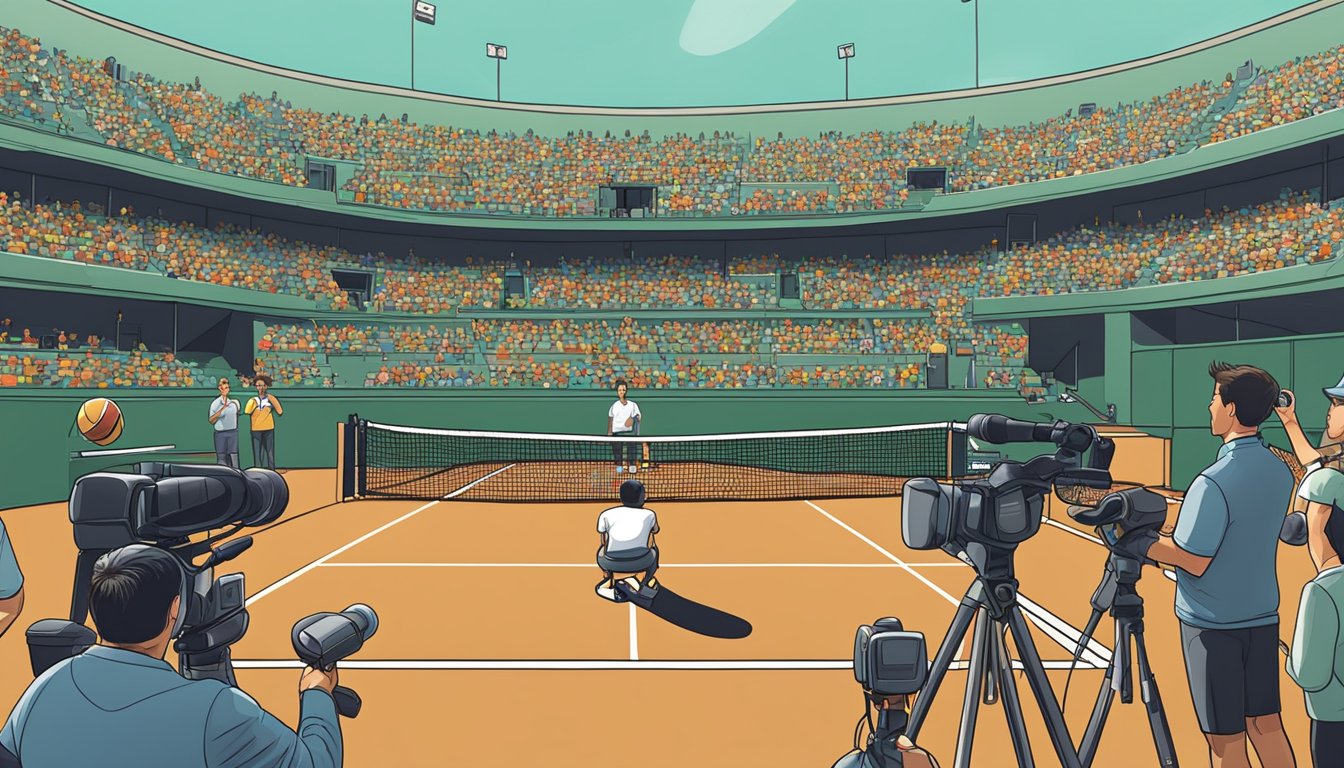
Tennis is more than just a game; it’s a way of life for many players. Asking the right questions can reveal insights into their training, mindset, and ambitions. This post covers 120 tennis player interview questions, you can explore what drives these athletes to succeed on the court and understand their unique perspectives.
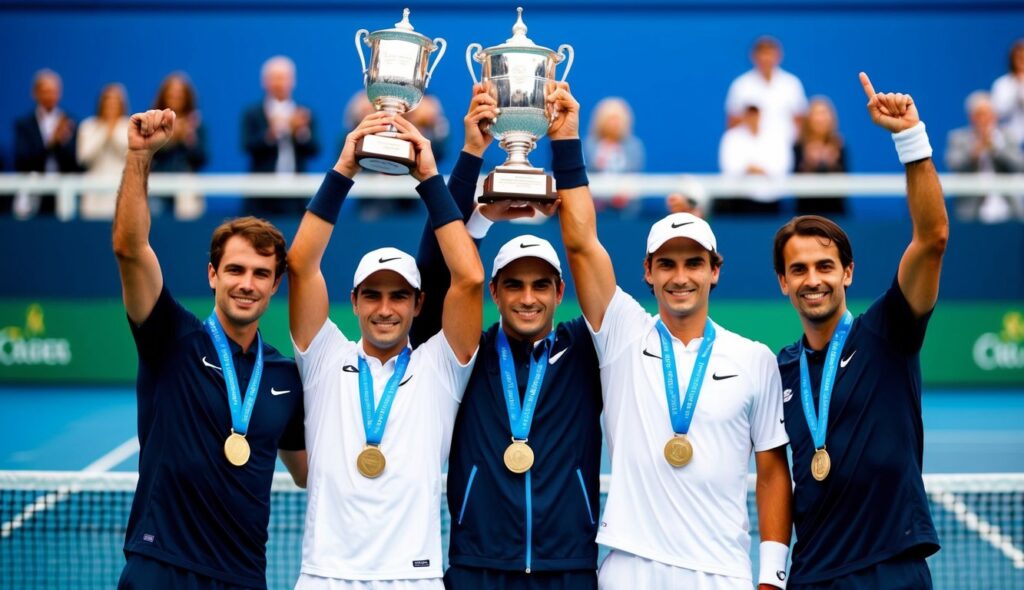
When you dive into these questions, you’ll find a blend of professional queries and personal reflections. This mix allows you to uncover stories about victory, challenges, and growth in the world of tennis.
These questions are not just for journalists or coaches. They’re also perfect for anyone eager to learn more about tennis from those who live it every day.
Whether you’re a fan looking to connect with players’ personal journeys or working hard to get selected in Tennis Team, these questions open a window into the sport.
The Heart of Tennis
In tennis, mastering the mental game is as crucial as physical skills. Strong mental resilience and an effective playing style, including sharp footwork, can give you an edge over your opponents.
Mental Resilience in Matches
Mental resilience on the court helps you stay strong during tough matches. It’s important to control your emotions. Keeping calm and focused during crucial points can make a big difference in outcomes. Building mental toughness allows you to recover quickly from setbacks.
Visualizing success before and during matches strengthens your mental game. Positive thinking helps you manage stress and pressure.
Practicing concentration techniques can help maintain focus even when the game gets difficult. Mental preparation is as key as physical fitness in tennis.
Playing Style and Footwork
Your playing style affects how you approach each game. Aggressive players focus on powerful shots to pressure their opponents. Defensive players rely on returning every shot effectively.
Understanding your strengths will help refine your approach to each match.
Footwork is vital for maintaining balance and speed on the court. Quick, precise steps enable you to reach shots with ease and control. Practicing footwork drills can improve agility, positioning you better for returns. Good footwork enhances both offensive and defensive gameplay.
Attention to these elements helps develop a well-rounded tennis game.
120 Interview Questions & Answers for Tennis Players
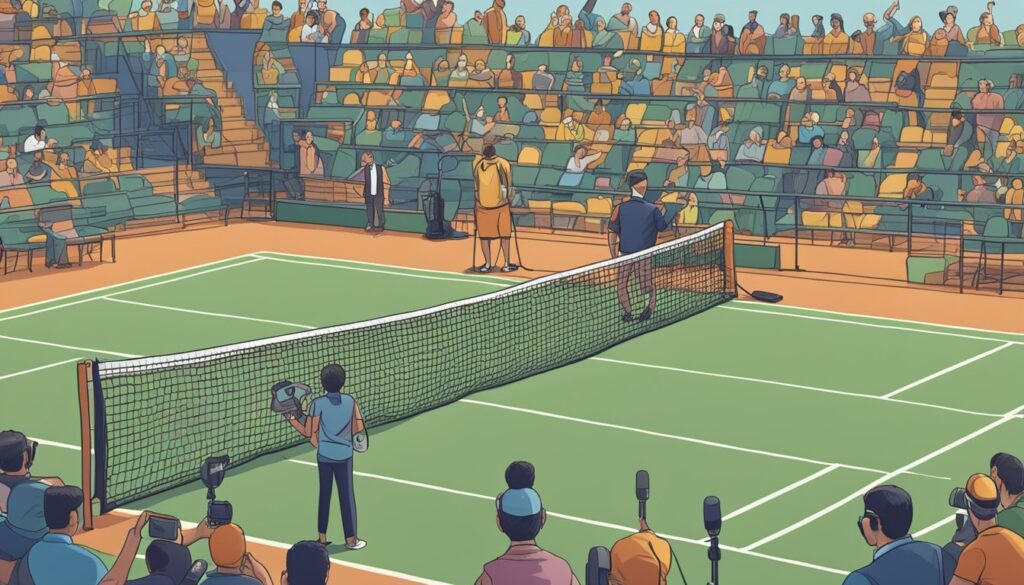
- How did you start playing tennis?
I started playing tennis at age six when my parents enrolled me in a local tennis club. - What motivates you to keep playing?
The love for the game and the thrill of competition motivate me. - Who is your tennis idol?
I admire Serena Williams for her strength and determination. - Describe your training routine.
My routine includes daily drills, fitness training, and strategy sessions. - How do you handle pressure during a match?
I focus on my breathing and stick to my game plan. - What’s your favorite surface to play on?
I prefer clay courts because they suit my playing style. - How do you prepare for a tournament?
I prepare by analyzing opponents, fine-tuning my skills, and ensuring I’m mentally ready. - What’s your biggest achievement in tennis so far?
Winning my first international tournament was a significant milestone. - What are your goals for this season?
My primary goal is to improve my ranking and win more titles. - How do you maintain your fitness level?
I follow a strict fitness program with my trainer, focusing on strength and agility. - How do you deal with losses?
I analyze what went wrong and work on improving those areas. - Who is your toughest opponent?
Toughest is subjective; each opponent presents different challenges. - What do you enjoy most about tennis?
I enjoy the thrill of competing and the feeling of hitting a perfect shot. - How do you balance tennis with other commitments?
I prioritize and manage my time efficiently to balance everything. - What’s your go-to strategy in a match?
I aim to play aggressively while being mindful of unforced errors. - How do you recover after a tough match?
Recovery involves rest, hydration, and gentle stretching. - What’s your favorite tournament and why?
The Grand Slam events are favorites due to their prestige and atmosphere. - What role does nutrition play in your training?
Nutrition is crucial; I follow a balanced diet to fuel my performance. - How do you handle travel for tournaments?
I plan ahead and ensure I have a comfortable routine on the road. - What advice would you give to aspiring tennis players?
Focus on hard work, be patient, and enjoy the process. - How important is mental strength in tennis?
Mental strength is as important as physical skill for success. - How do you improve your skills?
Constant practice and learning from coaches are key to improvement. - How do you set your goals each season?
I set realistic yet challenging goals to push my limits. - What do you do during the off-season?
I use the off-season to rest, recover, and work on specific skills. - Describe your training programs.
Training programs are tailored to hone my strengths and address weaknesses. - How does playing doubles differ from singles?
Doubles requires more teamwork and coordination with your partner. - What do you consider your biggest strength on court?
My strongest asset is my quick serve. - What’s your approach to handling injuries?
I focus on proper recovery and follow medical advice diligently. - How do you build stamina for long matches?
I engage in cardiovascular exercises and endurance training. - What role do coaches play in your career?
Coaches provide guidance, strategy, and support essential for progress. - How do you stay motivated during training?
Setting small milestones keeps me motivated day to day. - What’s your favorite drill during practice?
I enjoy footwork drills because they sharpen my agility. - How do you maintain focus during a match?
I use concentration techniques and stay present-minded. - What’s the biggest lesson tennis has taught you?
Tennis has taught me persistence and the value of hard work. - How do you adapt to different playing conditions?
Adapting requires versatility in strategy and mindset. - What book or movie inspires you as an athlete?
“Born to Run” inspired me with its powerful stories of endurance. - How do you stay calm under pressure?
Visualization and breathing exercises help me maintain calmness. - What’s your favorite part about being a professional player?
Travel and meeting diverse players are highlights of the career. - How do you plan your recovery days?
I focus on light activities and wellness routines on recovery days. - What’s your dream match-up?
Playing against Roger Federer would be a dream come true. - What equipment do you find essential?
A reliable racket and comfortable shoes are essential. - How do you develop new strategies?
Studying opponents and game trends helps create effective strategies. - How do you handle media interviews?
I stay composed and represent my views honestly. - What does your daily schedule look like?
My day includes practice, fitness, and rest periods for balance. - What’s your philosophy on sportsmanship?
Respect for opponents and fair play is paramount. - How do you prepare your mind for a match?
I use visualization to mentally prepare for challenges. - What role does technology play in your training?
Technology assists in analyzing performance and improving tactics. - How do you balance personal life and tennis?
Efficient time management helps maintain this balance. - What’s your favorite tennis memory?
Winning my first junior championship remains unforgettable. - How do you deal with distractions on the court?
I center my focus back on the game when distractions arise. - Why did you choose tennis over other sports?
- What’s the most challenging part of training?
- How do you handle difficult playing conditions?
- What’s the importance of teamwork in doubles?
- How do you stay informed about tennis trends?
- What’s your typical pre-match meal?
- How do you develop mental toughness?
- How do you celebrate a big win?
- How important is visualization in your preparation?
- Describe your experience faced with a tough loss.
- What recovery techniques do you use?
- How important is feedback from your coaches?
- How do you enhance your speed on the court?
- What’s your approach to playing against aggressive players?
- How do you prioritize different aspects of training?
- How do you evaluate your performance after matches?
- What role does rest play in your training regime?
- How do you set your training goals?
- What’s your approach to dealing with stress and anxiety?
- How do you maintain a healthy diet on the road?
- What’s your proudest moment in your tennis career?
- Describe a key mentorship experience in tennis.
- How do you stay injury-free during intensive training?
- How do you build confidence for critical matches?
- What’s the significance of warm-up and cool-down routines?
- Describe the mental preparation for a major tournament.
- How important is adaptability in tennis?
- How do you handle long stretches away from home?
- What’s your approach to learning from both wins and losses?
- How do you foster a winning mindset?
- What role does flexibility play in your training?
- How do you prepare for matches against top players?
- What’s your perspective on professional growth in tennis?
- How do you incorporate feedback from matches into training?
- How do you approach game strategy differently between opponents?
- Describe a turning point in your tennis journey.
- What skills are essential for becoming a top player?
- How do you keep your tennis passion alive throughout the years?
- Describe a pivotal match that shaped your career.
- How do you balance discipline with creativity on the court?
- How do you develop a consistent serve?
- What’s your philosophy on personal and professional growth?
- How do you leverage match experience for improvement?
- How do you prepare mentally for different game styles?
- How do you plan your travel logistics for tournaments?
- Describe a memorable training session.
- How important is setting short-term vs long-term goals?
- How do you maintain longevity in your tennis career?
- How do you cultivate a strong work ethic?
- What’s your approach for adjusting mid-match strategies?
- How do you build strategic partnerships in doubles?
- What’s your view on handling unexpected match challenges?
- How do you optimize your practice sessions?
- What’s your approach to fitness outside the tennis court?
- How do you instill discipline in your tennis practice?
- Describe a major influence in your tennis life.
- How do you keep up with the competitive nature of tennis?
- How do you overcome performance anxiety?
- Describe a moment when you demonstrated resilience.
- How do you navigate through tough matches?
- How do you integrate learning new techniques into practice?
- How do you keep your mindset positive during prolonged competition?
- How do you enhance coordination in your training?
- What’s your strategy for post-match recovery?
- Describe your journey to professional tennis.
- What’s your approach to game analysis?
- How do you stay grounded while playing high-stakes matches?
- Describe how sportsmanship influences your playing style.
- How do you blend physical and mental preparation effectively?
- What are your personal values as a tennis player?
Tennis Players and their Development
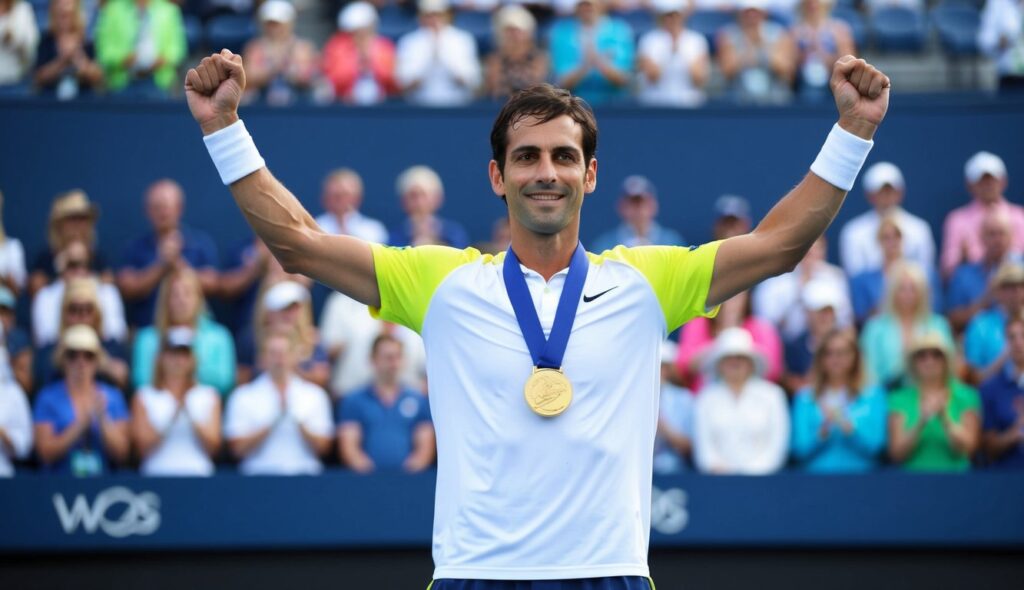
Developing as a tennis player involves a blend of rigorous training, effective coaching, and maintaining physical health. Success depends on teamwork and individual skills.
Training Regimen Essentials
A solid training regimen forms the foundation of any player’s development. Consistency and variety in workouts help improve skills and prevent injury. A typical daily schedule may include:
- Warm-ups and stretches
- Drills for footwork and agility
- Technique sharpening for serves and volleys
- Endurance building through running
Including rest days and recovery practices is critical. Balancing intensity and recovery is key to avoiding burnout and injury.
Role of Coaching Methods
Coaching methods greatly influence player development. A coach’s approach should adapt to a player’s personal needs and style. Techniques might focus on mental resilience, technical skills, or tactical intelligence. Feedback is crucial.
Encourage growth through positive reinforcement. Personal training sessions and group practices should be well-balanced. Emphasizing open communication between coaches and players nurtures growth and confidence.
Physical Demands and Well-being
Tennis is physically demanding, requiring strength, endurance, and agility. Balancing these demands with daily life is crucial for well-being. Players should incorporate strength training for core stability and muscle endurance.
Flexibility exercises reduce injury risks. Nutritional needs should not be overlooked either. A balanced diet provides energy for intense matches and recovery. Monitoring mental health keeps stress levels in check and enhances performance.
Teamwork and Individual Contributions
While tennis is often seen as an individual sport, teamwork plays an important part, especially in doubles matches. Understanding and supporting your partner’s style and strengths benefits the team. Maintaining focus on individual contributions improves the overall team dynamic.
You should share strategies and play to each member’s strengths, fostering a supportive environment that encourages personal and collective success. Communication on and off the court strengthens bonds and enhances performance.
Preparation and Routine of Tennis Player
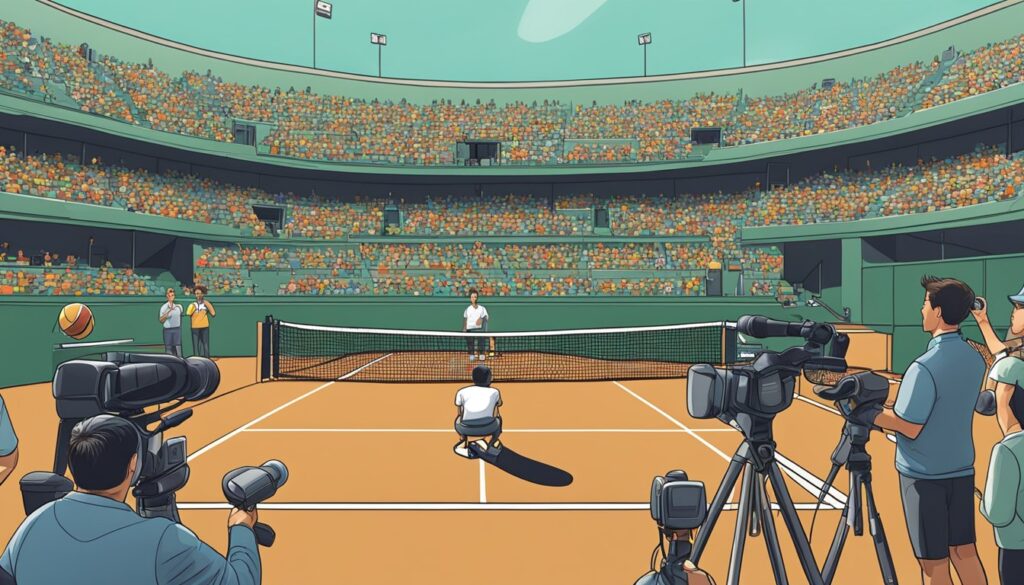
Preparing for a tennis match involves setting up routines and strengthening your mental game. This not only enhances performance but also builds confidence and focus.
Pre-Match Routines
Having a consistent pre-match routine helps in calming nerves and boosting confidence. Many players find it helpful to organize their gear and check their equipment well before the match.
Warming up is crucial, involving light jogging or skipping to get your blood flowing.
Mental Conditioning Techniques
Mental conditioning is the key to staying sharp and composed during matches. Positive self-talk helps you maintain a good attitude, building confidence through affirmations like “I can win” or “Stay calm.”
Visualization techniques involve picturing yourself executing perfect shots, which prepares your mind for success. Practicing deep breathing exercises can reduce anxiety and keep you centered.
Staying present-focused helps in not dwelling on past mistakes, but rather concentrating on the current moment. You may find it useful to develop a short mental mantra to recite between points. These strategies assist you in facing challenges with a calm and focused mind.
Frequently Asked Questions for Tennis Players

Explore the mental preparation and daily routines of a tennis player. Learn about handling competition pressure, coaching support, and recovery strategies.
How do you mentally prepare for a tough match?
Mental preparation is crucial for peak performance. You can visualize successful plays and focus on your game plan. Deep breathing or meditation might help calm your nerves.
What does a normal training day look like for you?
Your training day includes a mix of workouts, drills, and practice matches. You might start with a warm-up, followed by skill exercises. Fitness training ensures endurance, while cool-down activities help recovery.
Can you describe a particularly memorable match and what made it stand out?
Each match has unique challenges. One memorable game could be a close contest where you triumphed against a strong opponent.
Key factors might include your strategy, mental strength, or a comeback victory.
How do you handle the pressures of competition?
Competition stress is common in sports. You could use techniques like goal-setting, focusing on the present moment, or seeking support from coaches and teammates to manage pressure effectively.
What role has your coaching team played in your development as a player?
Coaches guide your growth by refining your skills and strategies. They offer valuable insights and personalized feedback, helping you enhance your strengths and address weaknesses.
What are your strategies for dealing with injuries and recovery?
Recovering from injuries requires careful management. You might work with physiotherapists and follow tailored recovery plans.
Staying patient and proactive about rehabilitation ensures a quicker, safe return to the court.
All the Best!






